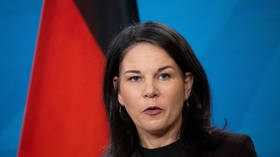Gazprom considering next move over Ukraine's unpaid bill
Russian energy giant Gazprom has told Ukraine that if it doesn't pay off a debt of $US 1.5 billion by Monday, gas supplies to the country will be cut off. Ukraine was forced to increase its dependence on more costly Russian supplies when deliveries from C
Officials from Ukraine's Naftogaz will arrive in Moscow on Friday to try and sort out the disagreement.
According to an agreement signed in 2004, Ukraine receives gas from Central Asia through Gazprom pipelines.
However, this year, due to cold weather, Central Asian states were forced to cut the amount of gas they were able to sell.
Gazprom agreed to help make up for shortages by delivering more costly Russian fuel to Ukraine. But, according to the energy giant, the country failed to pay the price difference.
“Ukraine’s debt for Russia’s gas supplies is approaching $US 500 million, while the total overdue debt for gas to Ukraine has already reached $ US 1.5 billion,” Gazprom’s spokesman Sergey Kupriyanov says.
Ukraine's Prime Minister Yulia Timoshenko says the Swiss-based company RosUkrEnergo, which is in charge of overseeing the transit of supplies, could be to blame.
Aleksandr Gudima, Ukraine’s Prime Minister energy advisor, says, “A week ago Ukraine's leadership officially decided to stop using middlemen like RosUkrEnergo”.
“Russia, particularly Dmitry Medvedev, backed our decision. They have to understand it takes more than a day to cancel these legal contracts. I am sure we'll pay all our debts in the next few weeks,” he adds.
Timoshenko now wants direct deals between Gazprom and Ukraine’s Naftogas.
But the country's President Viktor Yushchenko is against changing the transit scheme.
Meanwhile, Gazprom, which delivers its gas to the EU through Ukraine, promised the latest row would not affect European consumers.
However, the European Commission urged the two sides to solve the issue as quickly as possible.
Gazprom has given Ukraine until Monday to pay off the debts.
Russia supplies 80% of Ukraine’s gas and cost has always been an issue.
On New Year’s Day 2006 the row came to global attention, when, in the middle of one of the coldest winters in two decades, Gazprom turned off the taps.
The disagreement had been dragging on for months. As an ex-Soviet state Ukraine had enjoyed subsidised gas for many years, but in March 2005 it was told it would have to start paying market prices.
Ukriane objected, and there were months of deadlock. It wouldn’t agree to higher gas prices, Gazprom wouldn’t pay more to transport it. When no agreement was reached, the country was cut off.
A compromise deal was reached just three days later. Ukraine agreed to pay roughly double its previous price for its gas, while Gazprom’s transit costs were also increased.
However, European gas supplies were affected, although Gazprom officials insisted they were not the ones at fault.
“Ukraine is stealing gas from an export pipe destined for European consumers. We will take all necessary measures to supply gas to Europe according to existing contracts,” Aleksandr Medvedev, Gazprom Deputy Chairman said.
Ukraine later admitted it had been siphoning off supply intended for the EU countries.
Almost exactly a year later, Belarus was in the spotlight – and, if gas wasn’t enough, now oil was poured on the fire.
A last-minute deal prevented Minsk’s gas supplies being turned off on New Year’s Day 2007, but as soon as that issue was resolved, another reared its head. It concerned the Druzhba, or “Friendship”, pipeline, which passes through Belarus’s territory and supplies Europe with around 10 % of its oil.
Minsk attempted to charge Russia’s oil transport monopoly Transneft a fee for each tonne of fuel passing through the pipeline. But Moscow said this was illegal and wouldn’t pay. In response Belarus began siphoning some off. On January 8, 2007, Russia cut it off.
Negotiations began, and three days later the oil was flowing again. As part of the deal Belarus scrapped its transport tax and Gazprom bought a 50% share in its national gas supplier.
For a time all parties were getting along, but unpaid debts meant Gazprom would clash with both Ukraine and Belarus again later in 2007.
In August Belarus hurriedly paid a $ US 460 million bill when threatened with a 45 % cut in its gas supply and Ukraine handed over $ US 1.3 billion after receiving a final notice last October.
Now it owes $US 1.5 billion more.












